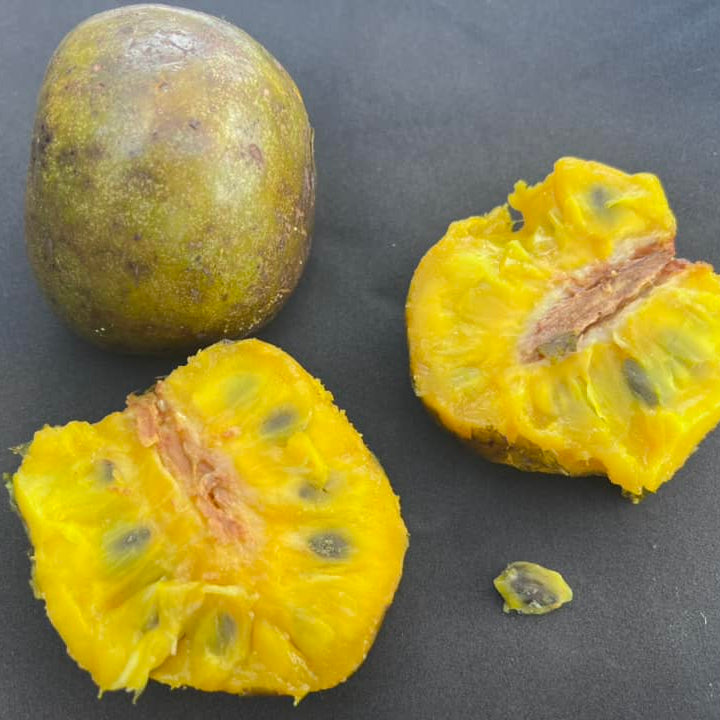Love it? Add to your wishlist
Your favorites, all in one place. Shop quickly and easily with the wishlist feature!
[message]
[title]
[message]



Veliyath Gardens
Couldn't load pickup availability
Amazon Custard Apple (Annona amazonica): A Creamy Rainforest Jewel for Your Garden
The Amazon Custard Apple, botanically known as Annona amazonica, is a rare tropical fruit plant with a reputation that travels far beyond the rainforests it calls home. Found in regions stretching from Costa Rica through Bolivia and deep into the Amazon Basin of Brazil, this exotic tree is revered for its lush appearance, aromatic fruit, and diverse medicinal values. Known for its soft, custard-like pulp, it remains one of the most sought-after additions to fruit gardens and tropical plant collections around the world.
Botanical Name: Annona amazonica
Common Names: Amazon Custard Apple, Wild Custard Apple, Anón del Amazonas (Spanish), Biribá-da-Amazônia (Portuguese)
Native Countries: Costa Rica, Brazil (especially the Amazon Basin), Bolivia
The tree is admired locally in South America for its spiritual, medicinal, and nutritional significance. It is often used in folk remedies and traditional food preparations by indigenous communities.
Tree Size: Medium-sized with an upright growth habit and prominent buttressed roots.
Foliage: Glossy green leaves that offer ornamental appeal in tropical settings.
Flowering & Fruiting: Begins to produce fruit within 3–4 years of planting under ideal conditions.
Fruit Appearance: Round to heart-shaped, pale yellow or light green when ripe, with a thin skin enclosing a soft, creamy pulp and few seeds.
The fruit of the Amazon Custard Apple is its crown jewel.
Texture: Silky smooth, custard-like pulp
Flavor: A refined blend of sweet tropical notes with light vanilla undertones
Aroma: Pleasantly creamy and subtly floral
Culinary Uses:
Consumed fresh by scooping out the pulp
Used in smoothies, milkshakes, ice creams, or tropical fruit salads
Can be blended into desserts or syrups
Its unique flavor is often compared to Cherimoya or Soursop but is generally considered more delicate and creamy. This makes it a prized delicacy among lovers of exotic fruits.
The Amazon Custard Apple isn't just flavorful—it’s rich in natural compounds that support wellness:
Antibacterial Properties: Fights against common bacterial strains and promotes gut health
Anticancer Compounds: Contains acetogenins, known for their selective cytotoxicity against cancer cells
Anti-inflammatory Benefits: Helps in reducing inflammation and easing symptoms of chronic ailments
Antidiabetic Effects: May help regulate blood sugar and improve metabolic function
Digestive Aid: The fiber-rich pulp supports smooth digestion
Traditional Use: Used in indigenous medicine for treating fever, respiratory ailments, infections, and skin irritations
The seeds and leaves, though not edible, have long been part of folk medicinal traditions and continue to be studied for their phytochemical potential.
For plant lovers aiming to cultivate Annona amazonica in their home gardens or nurseries, it’s an incredibly rewarding experience when nurtured with care.
Soil Requirements: Prefers rich, loamy, and well-draining soil with good organic matter
Sunlight: Grows well in full sun to partial shade
Watering: Needs consistent watering, especially during dry periods; avoid water stagnation
Climate: Thrives in warm, humid climates; not frost-tolerant
Pruning: Moderate pruning to shape the tree and encourage fruiting
Fertilization: Organic composts and mild fertilizers can enhance fruit quality
The tree grows at a steady pace and matures gracefully, making it ideal for fruit plant gardens or exotic tropical landscapes.
Ripe fruits should be consumed fresh or refrigerated for 2–3 days
Pulp can be scooped out and frozen for future use in smoothies or desserts
Seeds can be saved for propagation, though fresh saplings offer faster growth
Dry leaves may be used traditionally for decoctions but should be handled with expert guidance
Proper storage of the pulp enhances its shelf life and maintains flavor, allowing year-round enjoyment even outside the fruiting season.
Among the Amazonian communities, this tree is often linked to fertility and abundance. The fruit plays a role in festive meals and healing traditions. In native languages, it symbolizes nurturing due to its rich, creamy texture and ability to sustain hunger.
Today, it's becoming increasingly popular among gardeners seeking culturally rich, medicinal tropical fruit trees to diversify their landscape.
In a time where consumers are looking for health-conscious, natural additions to their diets, the Amazon Custard Apple is a shining example of nature’s bounty. Its flavor, medicinal value, and visual appeal make it more than a fruit—it becomes a daily health companion and conversation starter in any home garden.
By integrating it into your garden or kitchen:
You enjoy a naturally sweet, nutritious treat
You support digestive and immune health
You embrace a part of Amazonian culture
You enhance your garden with a rare and beautiful fruit tree
Veliyath Gardens is proud to bring you the Amazon Custard Apple (Annona amazonica)—a living link to the rainforests of South America. For plant enthusiasts, wellness seekers, and fruit lovers alike, this rare species is a truly meaningful addition to any garden.
Let your garden echo the essence of the Amazon. Choose this tree not just for its exotic status, but for the joy it brings—creamy fruit, green foliage, and stories rooted in nature and tradition.
Plant something extraordinary. Let it grow with you.
Soil Requirements: Prefers rich, loamy, and well-draining soil with good organic matter
Sunlight: Grows well in full sun to partial shade
Watering: Needs consistent watering, especially during dry periods; avoid water stagnation
Climate: Thrives in warm, humid climates; not frost-tolerant
Antibacterial Properties: Fights against common bacterial strains and promotes gut health
Anticancer Compounds: Contains acetogenins, known for their selective cytotoxicity against cancer cells
Anti-inflammatory Benefits: Helps in reducing inflammation and easing symptoms of chronic ailments
Its flavor, medicinal value, and visual appeal make it more than a fruit—it becomes a daily health companion and conversation starter in any home garden.
By integrating it into your garden or kitchen:
You enjoy a naturally sweet, nutritious treat
You support digestive and immune health




